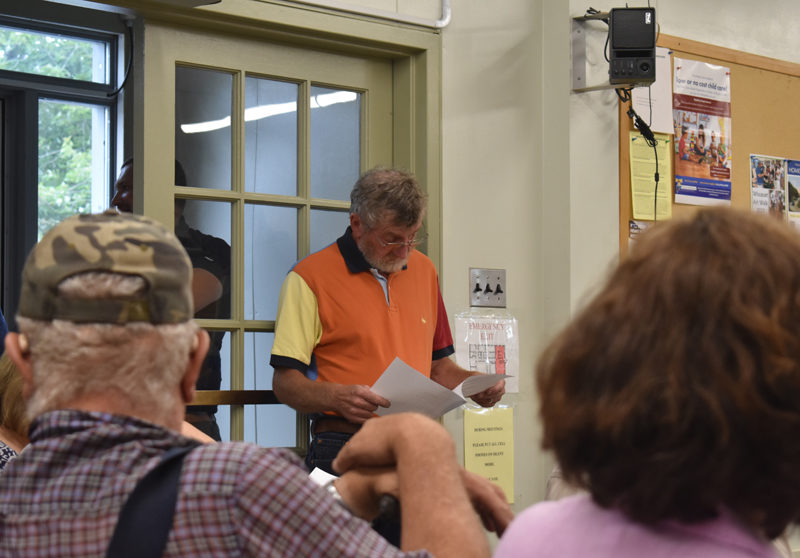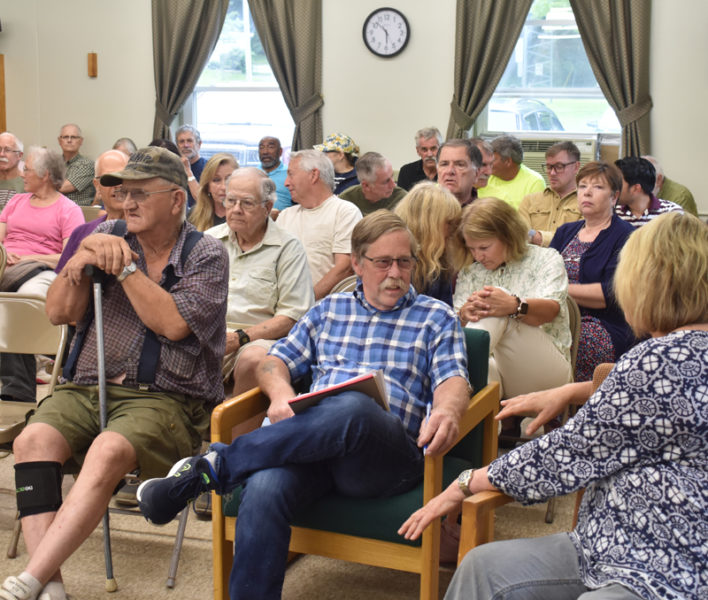
Jon Young, senior warden for St. Philip’s Episcopal Church in Wiscasset, reviews documents before the town’s select board meeting on Tuesday, July 18. Residents filled the municipal meeting room and the entryway seen behind Young to comment on a business license proposal from Amistad Inc. for a peer recovery and community center it has proposed in partnership with the church. (Elizabeth Walztoni photo)
A new business license for a recovery center by Amistad Inc. was tabled for two months by the Wiscasset Select Board following a lengthy and emotional public hearing at its Tuesday, July 18 meeting.
Before the vote, members said they needed more details from the organization about its plans, said they did not trust its communication, and asked for more community involvement, which the organization’s executive director, Brian Townsend, told the board felt like a campaign to stop the project.
The license hearing was for a Harbor Peer and Wellness Center inside St. Philip’s Episcopal Church at 12 Hodge St., according to the application. This project is separate from a housing project also proposed at the same address by the Portland-based organization now titled Commonspace, which runs housing and drug recovery programs in Portland and Bath.
According to an April press release from the church, its vestry voted early that month to approve partnerships with the nonprofit on both the wellness center and the housing construction as outreach ministries.
Townsend told the room that the center would offer peer support and community events for people “mostly” already in recovery, and would not be at a certification level to offer licensed counseling.
Board member Bill Maloney made the initial motion to table the license application after over an hour of public comment, and said he did so to give Amistad “time to look around to see if they can find somewhere else” for their center, met by applause from the room.
An amendment to his motion seconded and passed 3-0 by the board added a contingency that the organization return with a detailed and written plan for its operations. Board members also asked Amistad and St. Philip’s to host at least one additional community meeting.
Member Terry Heller recused herself from the vote due to her involvement with St. Philip’s, and James Andretta was absent.
Townsend said to the board in response that its vote felt like “a really effective campaign to block something.” He referenced the applause in response to Maloney as “indicative of the tenor we’ve been under” in talks with the community.
“Engagement is very much a two-way street,” he said.
Of particular concern in the meeting was whether or not the Hodge Street location would serve as a needle exchange for drug users, a program Amistad offers in Portland.
Townsend said the organization is only licensed by the Maine Department of Health and Human Services to do so in certain locations, and it is illegal elsewhere. Members of the board and audience said they were concerned the exchange could be possible in Wiscasset in the future even if it is not now, and that they wanted assurance in writing that this would not change.
A second major topic was Townsend’s statement that the center is for people in recovery from drug use and that anyone who was high would not be allowed in the building; residents wanted to know where they would go in that case.
The board’s request for a plan included details about how the organization would respond and make sure that those using would not be turned to the street instead.
Maloney asked Townsend how he would assure the audience that they would not find someone sleeping on their lawn.
“That doesn’t really happen,” Townsend said. “Ours is not the place where they go” when actively using.
In response to other audience questions, Townsend said the center would not receive referrals from the court system because it does not meet the licensing threshold of a recovery center. The group’s primary referrers are healthcare centers and sober living homes, he said.
The center would also specifically serve Lincoln County rather than the larger Midcoast region, according Townsend, although “people are allowed to come in.”

Wiscasset residents crowd the municipal building meeting room on Tuesday, July 18 before the select board’s review of a business license application by Amistad Inc. for a recovery center at St. Philip’s Episcopal Church. After an hour and a half of emotional public comment, board members voted to table the application for two months, citing concerns about the details of the plan, communication from both organizations, and a lack of trust in Amistad. (Elizabeth Walztoni photo)
Other audience concerns included reduction in their property values, changes in the character and safety of Wiscasset, drug sales and criminal activities in the village, attraction of drug users from outside Wiscasset, accidents as a result of drug use, and increased demands on the town’s first responders.
Communication and engagement with both Amistad and St. Philip’s were also raised. Two community meetings were held earlier this year, residents said, but have not been continued.
Several spoke in favor of the project, saying that drugs are already in the area and that the center would help those already affected return to participation in the community.
Four comments had been made directly in favor of the license and seven against when board members said they were not ready to vote yet.
“I don’t have a huge amount of trust right now with Amistad as an organization,” board Chair Sarah Whitfield said. “Even tonight, there’s been a few misleading statements … I know it’s not a lie, but it’s misleading.”
Whitfield said she came into the meeting with no legal reservations about approving the application, but was left with more questions than answers. She said communication from the organization was a “problem” and that she could not ethically or morally vote on an application on which she needed more information.
In his final address to the board, Townsend continued that drug problems are already present in Wiscasset and other towns were “happy” to have proposals from Amistad. He also said he had never received a similar reception to a project anywhere else in the state.
Like Maloney’s, his statement was also met by applause. Whitfield asked the room to be respectful on both sides and said that resident behavior around the project over the last several months has been condescending, disrespectful, and “disgusting, frankly.”
The meeting ended shortly after the vote. Town Manager Dennis Simmons did not conclude with his report.
“We’ve been here long enough,” he said.
The Wiscasset Select Board next meets at 6 p.m. on Tuesday, Aug. 1 in the town office and by Zoom.






